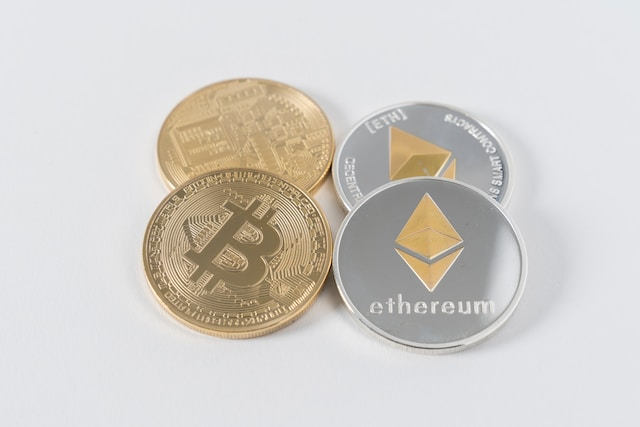
Updated: 26 12 月, 2024
Published: 4 12 月, 2023
It’s been some time since Bitcoin (BTC) and Ethereum (ETH) were just pie-in-the-sky ideas for many people. Early on, you could buy BTC or ETH for a couple of dollars, but they sell for a lot more today.
Despite the recent decline in their values, all know that they are the two most established assets in the crypto sphere, which is why most people choose either as their first investment in this space.
But which is better? To get your answer, you need to look at their differences first.

Bitcoin (BTC)
In 2009, a legend known as Satoshi Nakamoto introduced Bitcoin (BTC) as a new asset called cryptocurrency. The creator(s) hoped that Bitcoin would serve as a substitute for the established financial system.
A distributed system of nodes cryptographically validates Bitcoin payments and publicly logs them in a ledger known as a blockchain.
Ethereum (ETH)
Vitalik Buterin first came up with the idea for Ethereum (ETH) in late 2013; the cryptocurrency was launched eight years ago. Ethereum’s underlying aim goes well beyond the mere exchange of cash.
Ethereum is intended to serve as a platform to develop and run decentralized apps and contracts between users with no need for central authority. dApps, short for "decentralized applications," run on Ethereum’s native crypto coin, Ether (ETH).
Simply put, Ethereum works as a flexible blockchain technology that gives programmers access to the tools to create their own applications, while Bitcoin cannot do this.
What is the difference between ETH and BTC?
Despite the fact that both Bitcoin and Ethereum use a distributed ledger system along with some kind of encryption, the two have pretty different technical requirements. Let’s look at the nitty-gritty of what separates Bitcoin and Ethereum regarding how they work.
They Serve Different Purposes
Bitcoin’s primary use is as a kind of digital currency. Many people think of it as "digital gold," a safe haven from the ups and downs of more conventional financial markets. Mainly, it serves as electronic cash or a medium of exchange.
Ethereum, contrarily, has more applications because of its smart contract capabilities. Smart contracts are a kind of distributed software. For this reason, Ethereum is considered the foundation of the DeFi sector, which wants to change conventional financial institutions without relying on centralized authorities.
Most NFTs are built on Ethereum. Non-fungible tokens (NFTs) can prove ownership or legitimacy of anything from a work of digital art to a piece of virtual property.

BTC Comes with Lower Fees
When compared to Bitcoin, Ethereum currently has higher transaction costs. As you’ll see below, Ethereum offers you more speed, but this speed comes at a high price in gas fees.
These fees, which reimburse individuals for certifying transactions, may be exorbitant, particularly for small exchanges. Plans to improve scalability and lower gas prices are underway, but even with such improvements, the costs could be too high for some.
Supply & Inflation
There is a fixed limit to the supply of Bitcoin, which now sits at 21 million. Each time a block is mined, new Bitcoins are crafted, and block rewards are halved to fight inflation.
However, unlike Bitcoin, Ethereum is still without a hard cap, and this may worry some investors who place a premium on crypto assets subject to a deflationary financial system. Many of the suggested upgrades, such as EIP-1559, include deflationary techniques as part of the update itself, which might one day solve this problem.
Technology: PoS & PoW
When it comes to verifying transactions and keeping the blockchain secure, both cryptocurrencies utilize a consensus mechanism. But they both get the job done in their own unique ways.
The Blockchain technology works with proof-of-work (PoW) technology for validating Ethereum and Bitcoin transactions and adding blocks to the blockchain by solving math problems. This method is expensive and harmful to the environment since it demands a lot of computing power and electricity.
Ethereum is currently transitioning from a proof-of-work (PoW) consensus algorithm to a proof-of-stake (PoS) algorithm. PoS requires validators to retain a specific amount of crypto to avoid the energy consumption of mining. This is intended to reduce Ethereum’s monetary and ecological burden.

Scalability
The PoW technology that Bitcoin utilizes is inefficient for scaling. Because of this, the system can just process a small number of payments (about 7 per second). Scalability is a challenge for both Bitcoin and Ethereum.
Ethereum’s PoS offers more scalability and can execute up to 30 payments per second. Ethereum is currently working to solve these scalability difficulties with upgrades like the migration to PoS and a planned upgrade.
Smart Contracts and dApps
Ethereum’s capacity to leverage smart contracts and dApps is a significant competitive edge over Bitcoin. Smart contracts are computer code contracts that carry out their conditions once a buyer and seller enter them. This paves the way for fully automated, risk-free monetary transactions.
However, at the moment, Bitcoin does not work with either smart contracts or decentralized applications. Although some developers have implemented workable solutions to make Bitcoin blockchain compatible with smart contracts, they are not as popular as Ethereum’s case.

Is There Any Common Ground?
There are several areas where Bitcoin and Ethereum overlap. They are both blockchain-based, decentralized cryptocurrencies.
Cryptocurrencies like Bitcoin and Ethereum have robust communities and can work nicely for making payments or making an investment because they are growing in popularity.
Though they are very susceptible to market swings and highly volatile, financial institutions have shown a lot of interest in them.
Both currencies have certain essential features that make them likely to survive and thrive in the future despite their differences. Before making any investing decisions, people should think about how much risk they can take and how soon they want to see ROI.

Is it Better to Buy Ethereum or Bitcoin?
There are a few things to consider if you decide whether Ethereum or Bitcoin is the better long-term investment. There is room for both cryptocurrencies to expand and gain popularity, but there are differences.
Bitcoin is the more well-known and widespread choice. Therefore, it’s a safer bet. Ethereum is more experimental and potentially risky, but it also has more applications than simply digital cash.
In the end, it all boils down to your risk appetite and investment approach. Bitcoin may be the better choice for those who value security, while Ethereum may appeal to those who want larger returns and more flexibility.
Before making any financial commitments, it is crucial to do your homework and consult with professionals.

Is ETH or BTC the future?
Even though their futures are bright, Ethereum and Bitcoin are focused on different things.
The Ethereum 2.0 project is working to reduce transaction times and solve Ethereum’s scalability problems by switching to a PoS consensus mechanism. With this update and the expanding DeFi and Ethereum community, Ethereum is primed for growth.
As an anti-inflationary crypto asset, Bitcoin continues to dominate the cryptocurrency market, especially now that it is becoming more and more popular among institutions.
As the general public learns more about cryptocurrencies and the blockchain, experts in the field speculate about the future of virtual assets. Because of its finite quantity (21 million Bitcoins), Bitcoin has received more attention than Ethereum. Bitcoin becomes more valuable before halving, which cuts block rewards in half.
Ethereum, however, is not simply money but also a platform for building decentralized applications. Thus, it has considerable growth potential of its own. Scalability and support for smart contracts are two things that can help become more valuable than BTC.

Is ETH still worth buying?
Ethereum’s adaptability to new demands is a significant advantage, alongside its declining transaction costs. ETH 2.0, Ethereum’s most recent upgrade, promises to ensure the network’s viability and usefulness for decades to come.
Ethereum 2.0 is basically a revamp of the protocol that will switch to PoS. If the change goes well, it may significantly boost Ethereum’s value. But that’s only one of the possible upsides of buying Ethereum.
As of now, Ethereum’s value has increased by 26% since the beginning of the year, and it doesn’t seem to be slowing down anytime soon.

Bottom Line
When it comes to Bitcoin and Ethereum, there’s no doubt over their value and popularity as they are the two most established assets in the cryptocurrency market. Ethereum’s capacity to work with smart contracts and dApps has been a major factor in its rapid development, even as Bitcoin has become the more popular and well-known cryptocurrency.
But, when it comes to making an investment, you can’t just lean on your own research. You have to study the differences, determine your risk appetite, and calculate their expected ROI to see which one is a better option for your wallet.
给文章评分



